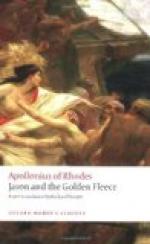[Footnote 1: e.g. compare Aen. iv. 305 foll, with Ap. Rh. iv. 355 foll., Aen. iv. 327-330 with Ap. Rh. i. 897, 898, Aen. iv. 522 foll., with Ap. Rh. iii. 744 foll.]
BIBLIOGRAPHY.
Two editions of the Argonautica were published by Apollonius. Of these we have only the second. The Scholia preserve a few passages of the first edition, from which the second seems to have differed only slightly. The old opinion that our MSS. preserve any traces of the first edition has long been given up. The principal MSS. are the following:—
The Laurentian, also called the Medicean, XXXII. 9, of the early eleventh century, the excellent MS. at Florence which contains Sophocles, Aeschylus and Apollonius Rhodius. This is far the best authority for the text (here denoted by L).
The Guelferbytanus of
the thirteenth century, which closely agrees
with another Laurentian,
XXXII. 16, of the same date (here denoted
by G and L^2 respectively).
There were in the early eleventh century two types of text, the first being best known to us by L, the second by G and L^2 and the corrections made in L. Quotations in the Etymologicum Magnum agree with the second type and show that this is as old as the fifth century. Besides these there are, of inferior MSS., four Vatican and five Parisian which are occasionally useful. Most of them have Scholia; the best Scholia are those of L.
The principal editions are:—
Florence, 1496, 4to. This is the editio princeps, by Lascaris, based on L, with Scholia, a very rare book.
Venice, 1521, 8vo. The Aldine, by Franciscus Asulanus, with Scholia.
Paris, 1541, 8vo, based on the Parisian MSS.
Geneva, 1574, 4to, by Stephanus, with Scholia.
Leyden, 1641, 2 vols., 8vo, by J. Hoelzlin, with a Latin version.
Oxford, 1777, 2 vols., 4to, by J. Shaw, with a Latin version.
Strassburg, 1780, 8vo and 4to, by R.F.P. Brunck.
Rome, 1791-1794, 2 vols., 4to, by Flangini, with an Italian translation.
Leipzig, 1797, 8vo, by Ch. D. Beck, with a Latin version. A second volume, to contain the Scholia and a commentary, was never published.




